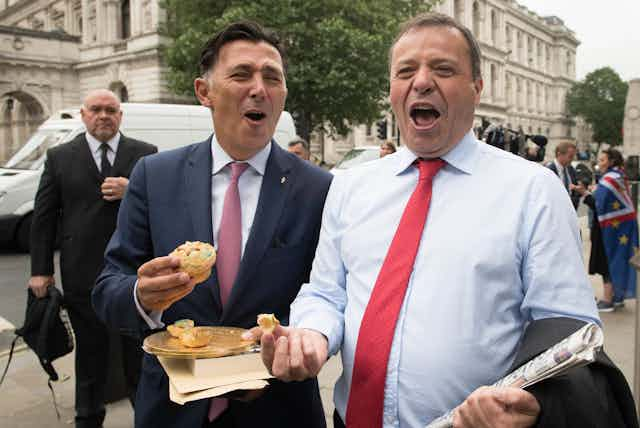A series of allegations regarding Russia and the 2016 EU referendum in the UK have been published the Observer newspaper, part of the Guardian stable. The claims centred around Brexit campaign Leave.EU (separate to the official Vote Leave campaign) and businessman Arron Banks, who bankrolled it in money and services to the tune of £12m, reportedly becoming the biggest political donor in UK history.
The country’s Electoral Commission has already fined Leave.EU £70,000 after an investigation in which it was “satisfied beyond reasonable doubt” that the campaign failed to declare £77,380 in its spending return for the referendum. This would have pushed it over the allotted £700,000 spending limit for the campaign.
But the allegations concerning Russia are altogether more difficult, troubling and potentially challenging for British lawmakers.
The Observer reports that documents it has seen suggest that there were multiple meetings between the leaders of Leave.EU and high-ranking Russian officials between November 2015 and 2017, two of which were said to have been held the week that Leave.EU launched its official campaign. The second allegation is also particularly interesting – that the Russian ambassador introduced key figures in Leave.EU to a businessman who purportedly offered Banks an opportunity to buy Russian goldmines. This also included a trip to Moscow to meet partners behind a gold project. Banks has repeatedly denied involvement with Russian officials or that Russian money played any part in the Brexit campaign.
Influence is many-headed
These allegations are, at present, just allegations. At this stage it is unclear which – if any – rules have been broken and what the consequences would be if they had. But the communications, according to the reports, do tell us something about different ways of peddling influence in elections and referendums. It’s especially interesting for those of us who research the area of political financing. We follow the money, But what if there’s no money? “Follow the deal that could materialise (as money) at a later date” doesn’t quite have the same ring to it.

In a previous article I outlined that money, in electoral terms, is hydraulic. Like water, it’s uncontrollable. It flows into the political system, finding its way around legal obstacles that are placed in its way. If money is hydraulic, then influence is the hydra. It has many heads, all of which present unique challenges for those trying to prevent it occurring unduly.
In my work I show that there are two broad types of corruption in politics. The first – donor-based corruption – is a relatively simple quid pro quo. Money is given as funding in exchange for a political service. This might be a favour, a particular policy, or some form of patronage or ennoblement. The second is deferred gratification – a type of corruption based around personal links and relationships. Wealth might still play a role, but corrupt activity is less likely to take the form of a tangible quid pro quo. It’s instead more likely to take an opaque form – a revolving door or the promise of future business deals.
A different kind of corruption
In practical terms this shows us that we shouldn’t think that cutting off obvious sources of (illicit) money into the political system will cut off the only potential corrupting influence. The hydra is a many-headed beast, legislation should reflect this. We often think that measures such as introducing a cap on donations and increasing levels of state funding will reduce levels of corruption in politics. While there are many good reasons for introducing more state funding of political parties, this is not one of them.
The way that money and influence was weaponised in the 2016 referendum has provided a multitude of lessons for academics, policymakers and journalists alike, even before the question of a Russian role came up.
Finally, it should also be noted that Banks and his colleague Andy Wigmore seem to revel in the role of chief mischief makers. Wigmore told a House of Commons committee that he sees his role, partly, as that of an “agent provacateur”. After that, he sent a picture of himself with a Soviet colonel in Cold War Berlin to Jim Waterson, media editor of the Guardian, saying it would “help with the Russian agent theme”. Many of the statements they make should be taken with massive a pinch of salt.

